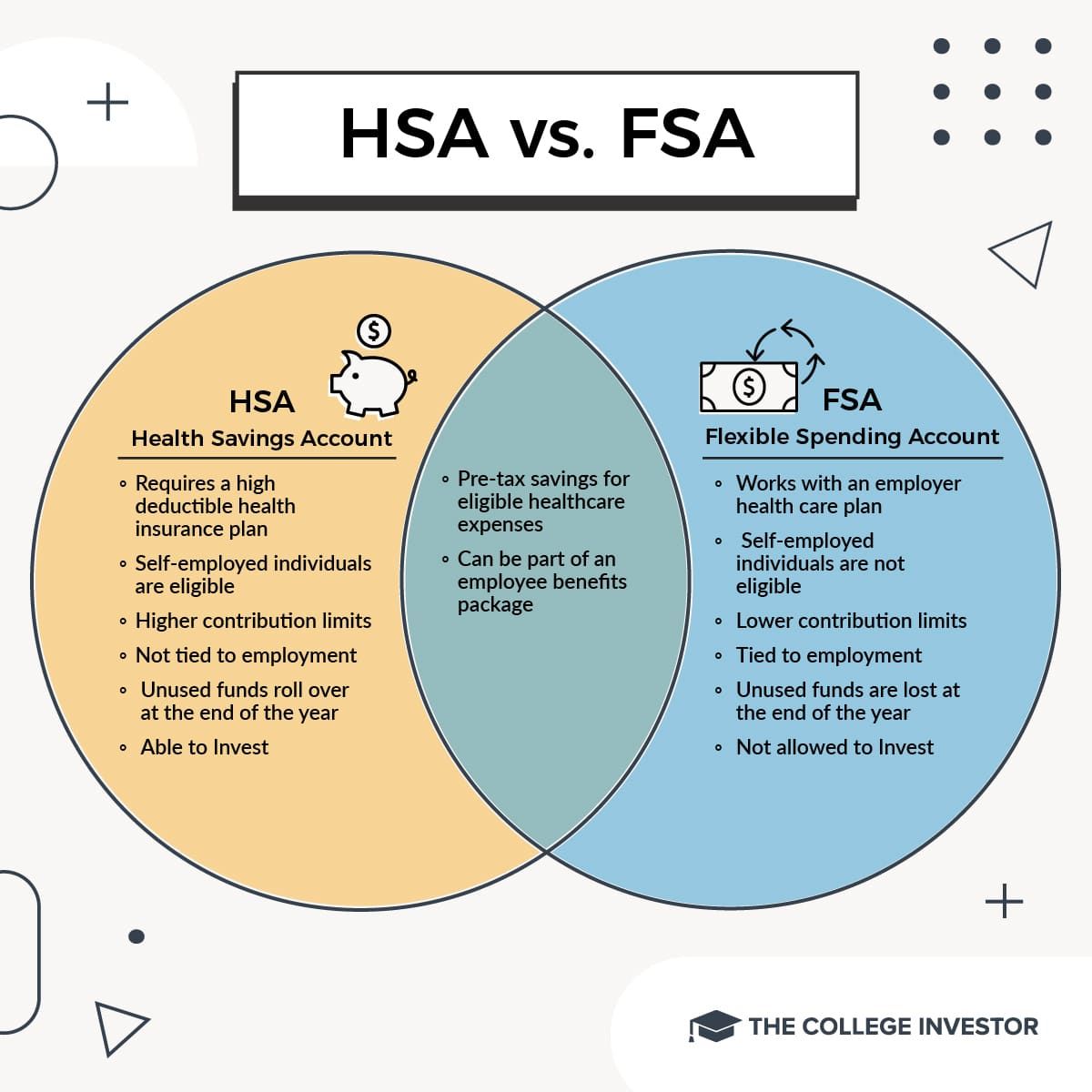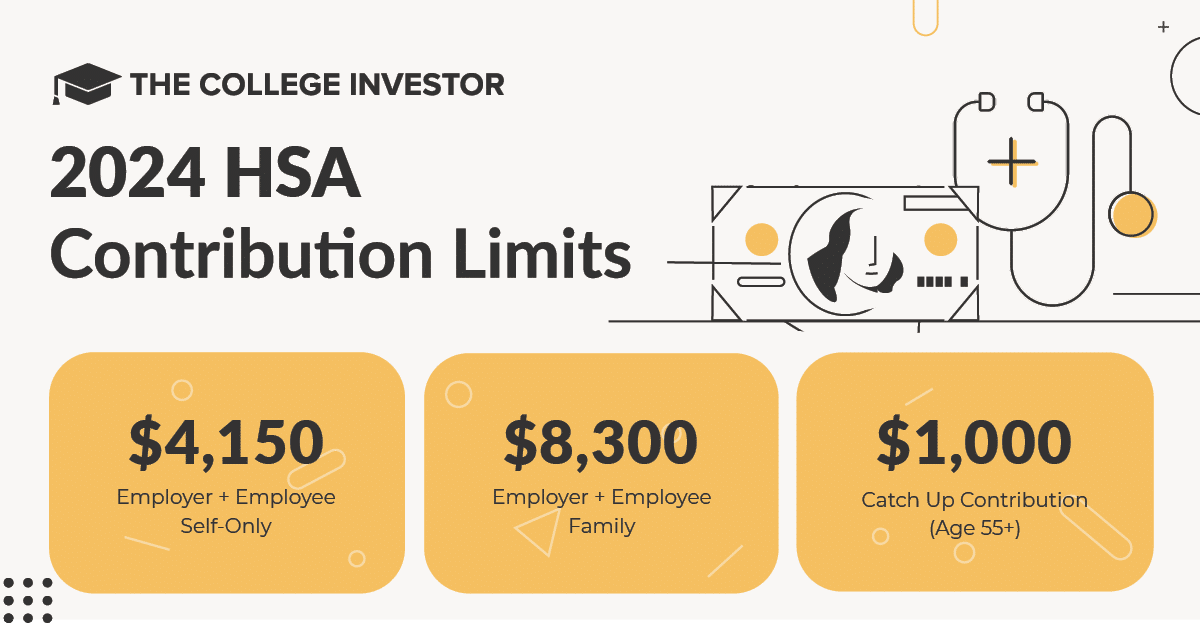
Both an HSA (Health Savings Account) and FSA (Flexible Spending Arrangement) allow you to save for healthcare expenses.
The main difference between an HSA and FSA is that the HSA has higher contribution limits and gives you the ability to invest.
Meanwhile, an FSA only allows you to contribute funds into the account and use those funds to pay for medical expenses.
There are also differences in contribution amounts, employer contributions, and qualifications based on your health plan and employment status.
Let's break down the similarities and key differences between an HSA and FSA.

What To Know About An HSA
HSA stands for Health Savings Account.
To qualify for an HSA, you must have a high-deductible health plan (HDHP). According to IRS Publication 969, the minimum deductible of an HDHP must be $1,500 for individuals and $3,000 for families. You can’t be on Medicare or be claimed as a dependent. You can be self-employed with an HDHP that allows an HSA.
Why would someone choose a HDHP over a non-HDHP? It can be a personal preference or depend on how much you regularly spend on healthcare. If you rarely go to the doctor, an HDHP can make economic sense.
There are contribution limits for HSAs. They are $4,150 for individuals and $8,300 for households in 2024. There is also a catch-up contribution of $1,000 allowed if you're over 55.

Your employer may offer an HSA with your health insurance plan. Some insurance plan titles state that they have an HSA available. You can always check with your employer or insurance company as well.
The HSA allows you to take your HSA with you if you switch employers since the account is owned by you. Unused funds also roll over each year.
It isn’t necessary to be an employee to get an HSA. If you have been recently laid off or are on COBRA with an HDHP, you can get an HSA if the plan allows it. If the plan doesn’t come with an HSA but does allow an HSA, you’ll have to shop around at different banks for an HSA account.
There are a few differences in HSAs when you’re employed vs. unemployed after you have been laid off. Without an employer, you’ll have to pay a monthly fee for the HSA account and there won’t be any company match. However, you can rollover your old HSA into a new HSA that might not have a monthly fee.
Can you ever take funds out of your HSA account for non-medical expenses? There is one condition that allows you to take funds out of your account for non-medical expenses without incurring a penalty: you must be at least 65 years old. Funds withdrawn at age 65 or older can be taken out tax-free as well.
On the flip side, if you aren’t 65 or older and decide to withdraw funds from your HSA for non-medical use, you’ll incur a hefty 20% penalty, which must be declared on your income.
The upshot is to try your best to estimate how much money should go into your HSA each year and not go over that amount. The last thing you want is to have funds locked up in your HSA that you need for something other than medical expenses.
What To Know About The FSA
FSA stands for Flexible Savings Arrangement.
FSAs are provided through your employer. Unlike an HSA, you don’t own the FSA account. If you decide to leave your employer, the FSA will not go with you and your funds will be lost, which is not the case with an HSA.
FSA funds are not actually lost. Instead, they go back to the employer. The act of leaving a company without FSA funds is called FSA forfeiture.
Whether or not FSA funds roll over each year is also up to your employer. In some cases, the employer may provide additional time into the near year to use any leftover funds. This is called a grace period and allows 2.5 months to use any rollover funds. Otherwise, those funds go back to the employer. In the case of what’s called carryover, up to $640 of carryover funds can be used in the new year, in addition to the contribution limit.
Contribution limits for FSAs are $3,200 for individuals in 2024, and you can only rollover $640 at the end of the year. You can change your contributions at open enrollment if your family situation changes, or if you change plans or employers.
As for any penalties when using funds for non-medical expenses, that is up to your employer.
And finally, your employer can always set lower limits.
HSA vs. FSA - Which One Should I Choose?
With its ability to carry over funds and go with you if you leave the company, the HSA offers greater flexibility over the FSA. It can be more difficult to qualify for compared to an FSA since you must have an HDHP and not be on Medicare or be a dependent. However, self-employed people can have an HSA if their HDHP allows for it.
FSAs are for employees only. Self-employed people do not qualify. Funds in an FSA do not roll over unless specifically allowed by the employer. If you decide to quit the company, you’ll leave any funds in your FSA.
To summarize, the HSA is most likely your best option. If an HSA is not possible, then try to get an FSA.

Robert Farrington is America’s Millennial Money Expert® and America’s Student Loan Debt Expert™, and the founder of The College Investor, a personal finance site dedicated to helping millennials escape student loan debt to start investing and building wealth for the future. You can learn more about him on the About Page or on his personal site RobertFarrington.com.
He regularly writes about investing, student loan debt, and general personal finance topics geared toward anyone wanting to earn more, get out of debt, and start building wealth for the future.
He has been quoted in major publications, including the New York Times, Wall Street Journal, Washington Post, ABC, NBC, Today, and more. He is also a regular contributor to Forbes.
Editor: Clint Proctor Reviewed by: Ashley Barnett